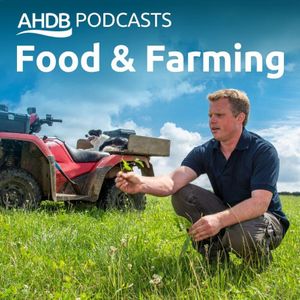257: Carbon Week 2021 – how farming is reducing its carbon footprint
AHDB Food & Farming - Un podcast de AHDB

Being part of an industry, which is frequently criticised for not doing enough to reduce its impact on the environment, it can be tough to know what and who to listen to. The more we all understand about the carbon cycle, and where we as farmers fit into it, the sooner we can understand how we can make a difference. This year, AHDB has launched Carbon Week, which takes place the first week in March (1 – 5 March) with the aim of sharing factual and practical information about what farmers can do to reduce carbon emissions on their farm. Farming in the UK is responsible for 10% of the nation’s total greenhouse gas (GHG) emissions. But the incredible thing about farming is that we have the ability to enhance the environment too, through sustainable land-use and management practices. For example, soils are for the third largest store of carbon, with the ability to absorb carbon from the atmosphere and locking it into the ground. In this podcast we begin with an overview of what greenhouse gases are and where farming fits into the equation with Jon Foot, Head of AHDB’s environment team. We are then joined by two farmers Tom Pearson and Phil White to tell us about their journey so far with reducing their carbon footprint on farm and changes they have made to their business. Finally, we speak to one of AHDB's senior scientists Harley Stoddart to explain what each sector can do to help make a difference. Tom Pearson tips: Things as simple as not cutting your hedgerow every year and rainwater harvesting. If you are combining carbon footprinting with a regenerative agriculture approach then there are some incredible opportunities. Lots of other industries are having to publish their carbon footprint for their product, we should be publishing ours. Phil White tips: One of the biggest changes so far has been implementing rotational grazing. I am convinced that this have lead to significant improvement in pasture quality and quantity and well as soil organic matter. Another immediate change is a move from a more intensive system where we housed our livestock through winter, to an outwintering and bale grazing approach. It has to make sense financially as well but from what I have seen so far I have seen the financial benefits already. Useful links: Carbon week https://ahdb.org.uk/carbon-week Carbon footprinting https://ahdb.org.uk/news/ahdb-launches-on-farm-carbon-footprinting Calculating your carbon footprint https://ahdb.org.uk/farm-excellence/Coton-Wood-Farm/calculating-and-reducing-your-carbon-footprint ELMS https://ahdb.org.uk/news/new-details-on-elms-design Carbon https://ahdb.org.uk/carbon Rethinking Methane video https://youtu.be/UOPrF8oyDYw